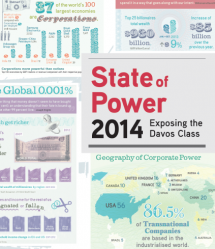State of surveillance: the NSA Files and the global fightback
"[E]ven if you’re not doing anything wrong you’re being watched and recorded. And the storage capability of these systems increases every year consistently by orders of magnitude to where it’s getting to the point where you don’t have to have done anything wrong. You simply have to eventually fall under suspicion from somebody even by a wrong call. And then they can use this system to go back in time and scrutinize every decision you’ve ever made, every friend you’ve ever discussed something with. And attack you on that basis to sort to derive suspicion from an innocent life and paint anyone in the context of a wrongdoer..."
- Edward Snowden, June 2013

Downloads
Authors
The surveillance state laid bare
If anyone told us anything about the state of power in 2013 it was Edward Snowden, who revealed that the surveillance capabilities of some of the democratic governments of the West are such that they can access almost anything their citizens do online or over a fixed or mobile telephone in the absence of meaningful democratic or judicial controls.
These powers are most advanced in the USA-UK led “Five Eyes” alliance (which also includes Australia, Canada and New Zealand) but many other European countries and NATO partners are known or believed to have advanced surveillance capabilities and to have cooperated closely with the NSA (the National Security Agency of the USA) and GCHQ (the UK Government Communications Headquarters). With a booming global surveillance industry on hand to help them, it is simply inconceivable that many less democratic governments are not engaged in the same practices.
It’s hardly news that spies spy, or that the powerful use surveillance and subversion to maintain their power and competitive advantage. In this sense the USA-UK hacking of top politicians’ phone calls is something of a convenient sideshow (the real story is the ease with which they did it); what’s new and important for the state of power is the simplicity with which individuals and entire populations can be placed under surveillance, the pivotal role that private companies play in facilitating this surveillance, and the lack of power and autonomy that we as individuals have to decide how we are governed and what happens to information about us.
In response to the revelations, newspaper editors and government whistle-blowers have joined more than 300 NGOs and 500 prominent authors from across the world in demanding an end to mass, indiscriminate surveillance; as I write a statement by “Academics Against Mass Surveillance” is also doing the rounds. Longstanding national campaigns against surveillance have been rejuvenated by the Snowden revelations and a host of parliaments and inter-governmental organisations are problematising the issue for the first time. But by no means are these still-growing campaigns a guarantee of meaningful reform. This paper looks at some of the key debates around surveillance reform and the battles ahead.
Key revelations
Only a tiny fraction of the secret documents liberated by Edward Snowden have been published or reported by the journalists he gave them to. While Glenn Greenwald and his colleagues have been accused of everything from helping terrorists and paedophiles to profiteering and covering-up damaging information, they have been both judicious and responsible in the way they have released information. Moreover, the drip-feed of stories revealing the complicity of an ever wider group of companies and countries has ensured that one of the most important civil liberties stories of modern times has now been front page news around the world for more than six months. No other leak in history has managed this feat. “Highlights” of the NSA Files released so far include:
• The Verizon Court Order: the first of the Snowden leaks revealed that the NSA was collecting the phone records of millions of Americans. While the scheme was launched by the Bush administration, it was widely believed that Obama had scrapped it.
• “Prism”: enables the NSA and GCHQ to “mine” information from the servers of some of the biggest American technology companies ( Google, Apple, Microsoft, Facebook, AOL, PalTalk and Yahoo). A similar programme called “Muscular” was intercepting millions of records a day from Yahoo and Google.
• “Tempora”, part of the “master the internet” programme: GCHQ intercepts and stores the vast amounts of data flowing in and out of the UK via the undersea fibre- optic cables that are the veins of the World Wide Web. Similar “bulk-intercept” programmes are run by the NSA (“Blarney”, “Fairview”, “Oakstar” and “Stormbrew”).
• “Xkeyscore”: an NSA run data-retrieval system used to access emails, telephone calls, internet usage records and documents transmitted over the internet
• “Boundless informant”: a data analysis and visualization system that provides an overview of the NSA’s surveillance activities by country or program. Almost 3 billion “data elements” from inside the United States were reportedly captured by the NSA over a 30-day period ending in March 2013.
• “Bullrun” and “Edgehill”: a $250 million-per- year programme under which the NSA and GCHQ (respectively) have defeated much of the encryption technology that underpins the security of the internet.
• Cyberwar, espionage and collusion: further revelations detail the extent to which the US is prepared to use international cyber-attacks to “advance US objectives around the world”, the monitoring of phone calls of 35 foreign leaders and the complicity in NSA-GCHQ surveillance of intelligence services of –among others – Belgium, Denmark, France, Germany, Italy, Japan, the Netherlands, Norway, Singapore, South Korea, Spain and Sweden.
